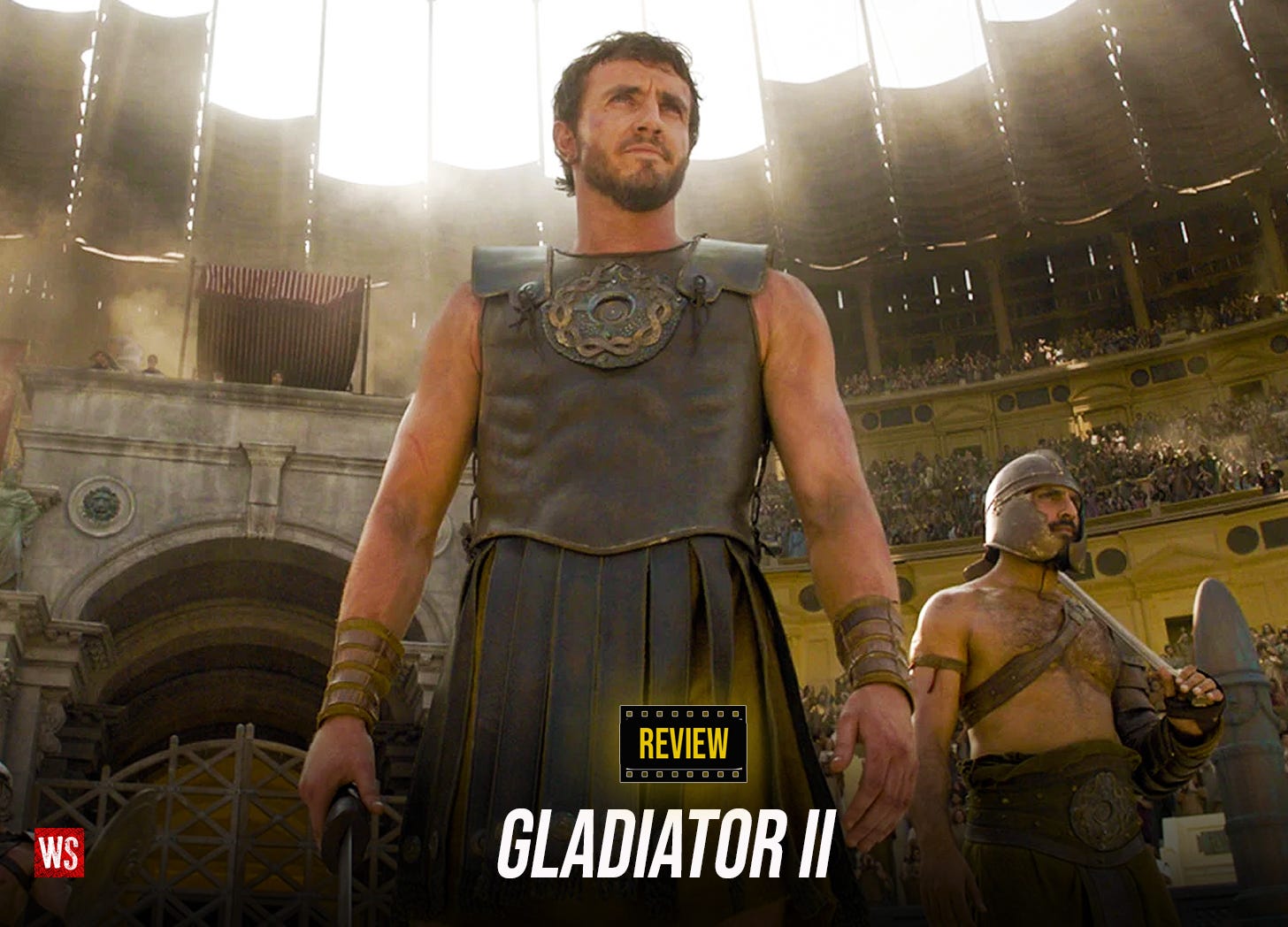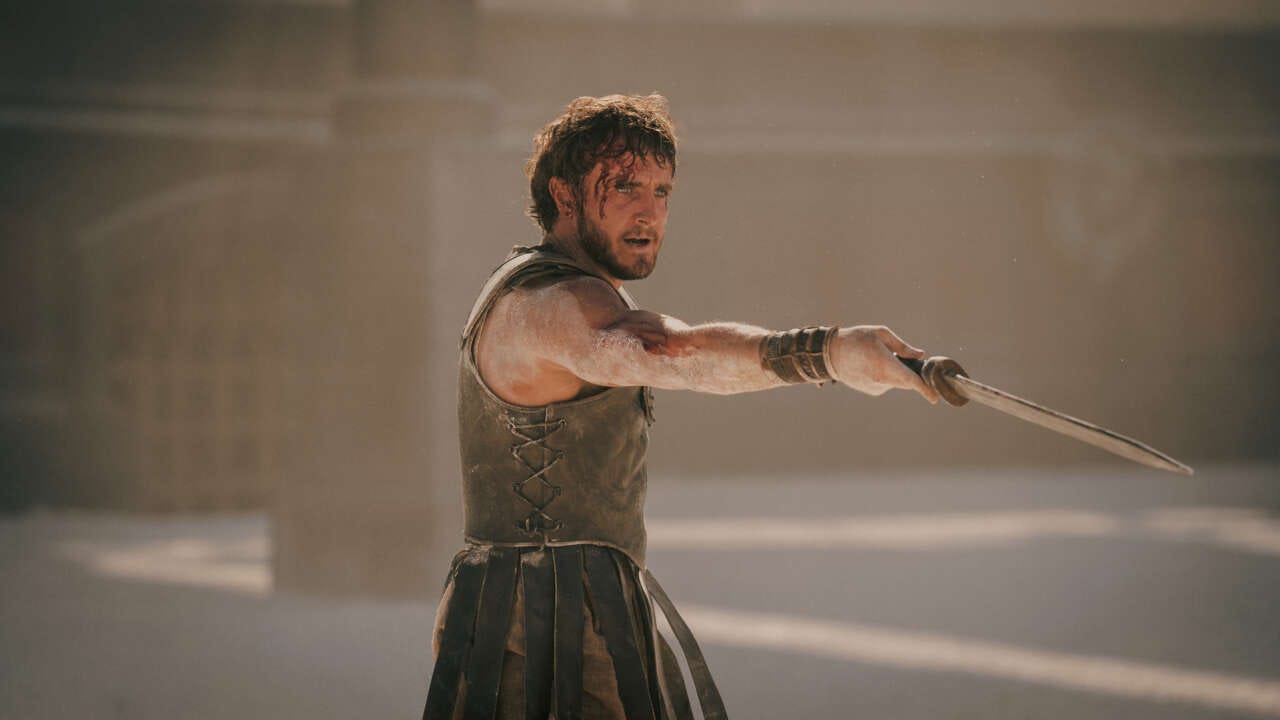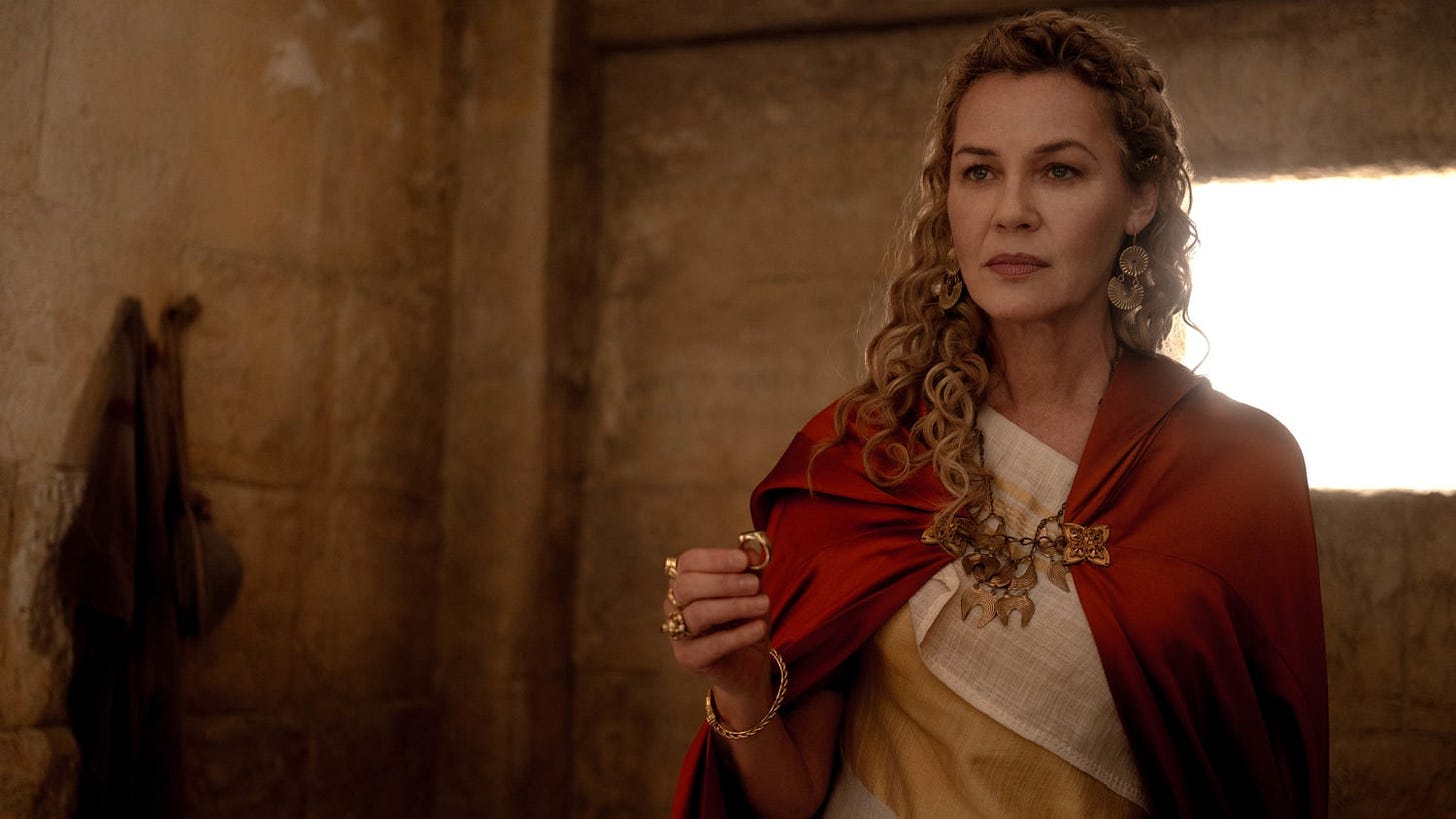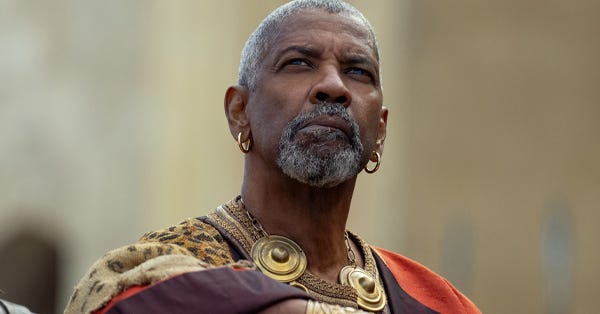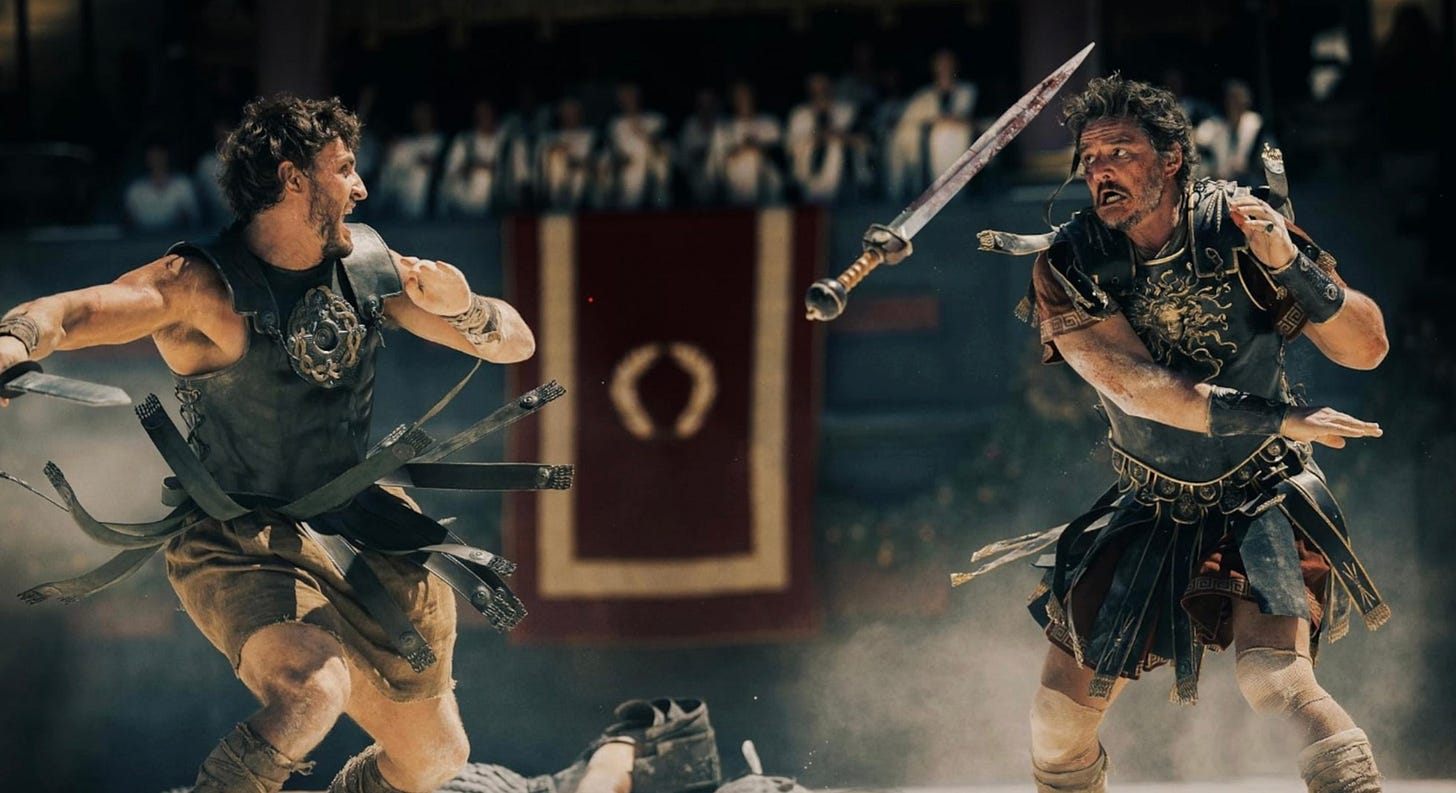Review: Gladiator 2 is barely an echo of Ridley Scott's epic original
Those who are about to watch, we warn you
It seemed like it would never happen. Echoes of a sequel to Gladiator floated around ever since the original was released in 2000 and now, twenty-four years later, it has arrived. The original Gladiator was the perfect fit for a director of Ridley Scott’s talents; epic in scope, sweeping in action, seeped in character, beautifully filmed, gloriously scored, and cast with superb talent that chewed scenery like someone starved for days.
The reverence of Richard Harris as Marcus Aurelius, the brute force of Russell Crowe as Maximus, and the maddening brilliance of Joaquin Phoenix as Commodus helped make Gladiator an absolute slam dunk in the historical epic category. Hans Zimmer’s score ushering in the visual masterwork that Ridley Scott spun left an indelible mark on cinema, earning it 5 Oscar wins, including Best Picture, as well as a Best Actor win for Crowe.
However, the fate of Crowe’s Maximus left many scratching their heads as to what a sequel to Gladiator would even be without him in it. The answer, of course, lay in the offspring of Lucilla (Aurelius’ daughter, as played by Connie Nielsen) and Maximus. Lucius is introduced in the first film (played by Spencer Treat Clark) as the idealistic child who looks up to Maximus, not knowing that he is his actual father. By the end of the film, as a deceased Maximus is carried out of the Colosseum, his final words being, “Lucius is safe”.
Now, some 15 years later, it is revealed that Lucius was whisked away for his own safety, as Lucilla feared that his life was in danger as the new heir to the throne after the death of Commodus. It directly contradicts Maximus’ last words, but there we are. Now living in Africa with his wife, Lucius (played by Brit star Paul Mescal) is a farmer/soldier for the ancient North African country of Numidia. The opening finds the Roman Empire attacking Numidia to gain control of it. Led by none other than The Mandalorian himself, Pedro Pascal, playing the new general of the army, Marcus Acacius, a brave, cunning, and conflicted man amidst his complex situation as a mandated world conqueror.
After a massive defeat at the hands of the Romans, Lucius is captured and made a slave, who later becomes a gladiator, owned and operated by none other than Macrinus, a trader, gambler, businessman, and aspiring politician played by the always great Denzel Washington. Rome is now controlled by two egomaniacal morons who have somehow risen to power (no explanation is ever given as to their ascension), played by Joseph Quinn and Fred Hechinger. They are certainly mean-spirited, but far from the conniving madman that was Commodus in the first film.
What follows is a very familiar journey from freedom fighter to slave to Gladiator to freedom fighter again, while politicians and military leaders plot and scheme to take the one thing humans have fought over since the dawn of time; power. The journey, however, is nowhere near as polished, earned, or refined in the way the first film was. Gladiator 2 zig-zags all over the place with the plot, characters, and actions seemingly smashed together at random, leaving far too many gaps in storytelling to sell the emotion, the suspense, or the stakes to any high degree. Chock full of clunky and perplexing moments, interspersed with some bloody violence and a few scenes of arena spectacle, Gladiator 2 is as half-baked as it gets.
The weight of Maximus’ journey was felt deeply in the first film, whereas Gladiator 2 finds limp motivation for Mescal’s Lucius. Sure, he has lost a loved one and he is estranged from his mother, but his quest for revenge feels lacking, let alone his general purpose. We never get inside his head to know who he is, what he wants, or why he wants it. He’s happy to settle for a Roman general’s head, but it still doesn’t feel as personal as it should. When it’s revealed that the general in question, Pascal’s Acacius, is Lucilla’s lover, there’s an added conflict, but the resolution doesn’t feel satisfying in any way.
Much of Gladiator 2 trades on a kind of mystery element, but the audience is pretty much in on the bigger aspects of that. It’s obvious from Lucilla’s interactions with Maximus in the first film that Lucius was likely her child and it’s confirmed multiple times over in the sequel, yet dangled in front of us continuously. In essence, it’s a waste of screen time trying to solve such a mystery, or even to use it to one’s advantage, as Washington’s Macrinus does.
While Gladiator had scenes of true, emotional rage, pain, and vengeance, Gladiator 2 lacks the presence of anything close to it, other than Mescal yelling at his mom to get out of his room or the Roman Caesar brothers having a hissy fit in the Colosseum. Sure, we get some cool action sequences, which is likely the driving factor for most audiences, but they are few and far between and again, not built up in a way that puts you on the edge of your seat with anticipation.
In terms of dialogue, Gladiator 2 again falls short of the epic, defining speeches that populated the original, leaving nothing memorable to stand out. Mescal is stoic, fast, and efficient at killing, but his performance is jilted, uneven, and lacking in the kind of presence that was needed to headline this kind of film. Talented, for sure, but he’s no Russell Crowe, and that’s what this film needed more than anything to make us feel invested again.
The standout performance, without question, belongs to Washington, who generates the most interest, humor, and hatred as the story goes on. It’s a great role for him, but one he could’ve done in his sleep. This is Washington just having fun and it’s great to see, but you have to wonder if Scott used him to his full potential (just kidding, you don’t have to wonder, he didn’t).
By the end, Gladiator 2 is just too much of a retread of the original, right down to the old “strength and honor” line, which somehow becomes the theme of the film, while not making much sense at all. Mescal gives several motivational speeches throughout, none of them memorable and all of them echoing the most base-level inspiration about dying bravely. The other tired theme that feels like a blight on the film is the whole “dream of Rome” bullshit, which was beaten to death in the first film (and worked just fine), but now just feels like cheap talk. The goalposts haven’t moved much in 15 years as everyone is seemingly always in a position to overthrow an incompetent Caesar. Rinse, repeat, snooze.
One of the most staggering omissions of Gladiator 2 is Hans Zimmer’s score. Stepping in for the sequel is Harry Gregson-Williams, normally an amazing composer in his own right, but the score here is so ridiculously muted that there were points that I wondered if the theater wasn’t playing the track somehow. The first film bolstered a pulse-pounding, rousing, emotional, and soaring score, complete with an unforgettable theme. Gladiator 2 may as well have used a copyright-free track off of YouTube by comparison and it’s a tremendous drawback to the film.
Now, all of this may make it seem like I hated Gladiator 2, but that’s not the case. If you’re a true fan of Ridley Scott, then you’ll know that no matter how “off” one of his films can be, there’s still quite a bit to enjoy. A rhino battle in the Colosseum? Dope. Crazed baboons fighting slaves? Wild. A naval battle with sharks in the arena? Epic. Some beautifully lit, atmosphere-dense scenes? Check on all counts. However, none of those great things can make up for a perplexingly weak, shallow, and uninspired script, as well as a lead actor who simply can’t fill the boots of his predecessor. Coupled with the lack of Zimmer’s orchestral flourish, Gladiator 2 simply won’t echo in eternity like the original and it’s impossible not to compare when so much of the film leans on what came before. You can attempt to judge Gladiator 2 on its own, but that isn’t the saving grace you may think it is.
While Ridley Scott may believe it’s one of the best things he’s ever done, I will respectfully disagree. It’s one of the most “fine” things he’s ever done (in fact, I much prefer his last polarizing effort, Napoleon, to this) and that’s more than okay for the prolific filmmaker who has given us a cavalcade of greats, from Alien to Blade Runner to Black Hawk Down to Thelma and Louise to The Martian to Kingdom of Heaven and everything in between, including the original Gladiator. At this point, it’s Ridley’s show, and I’m here for it, whether it’s a modern classic, a total disaster, or a flash in the pan. Are we not, at least, entertained? Why yes, Ridley, we are.



